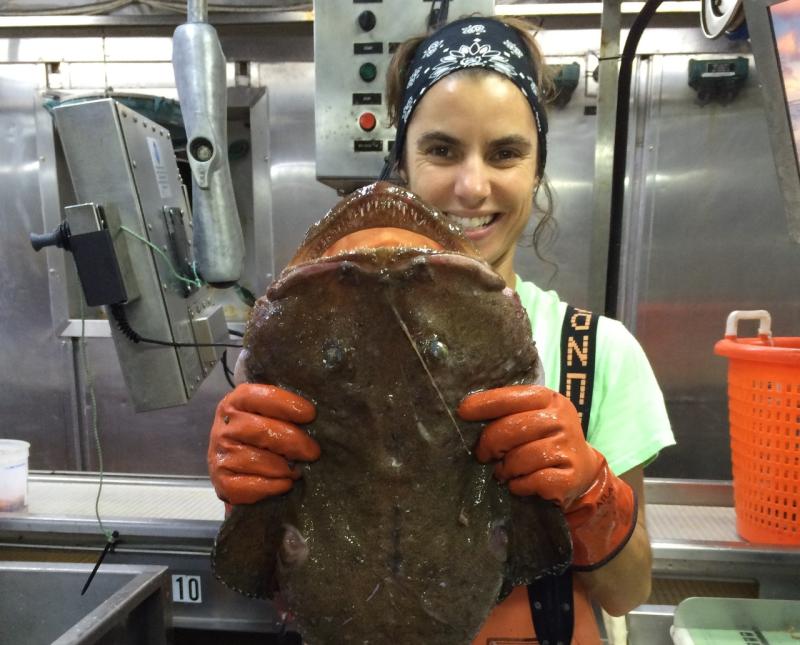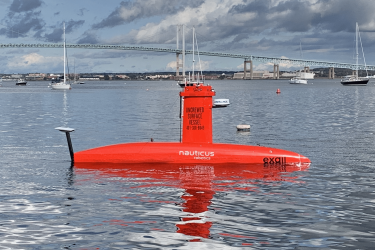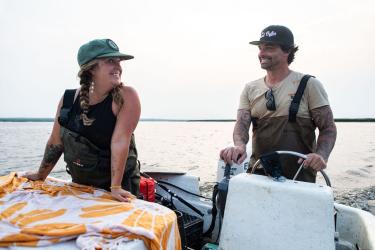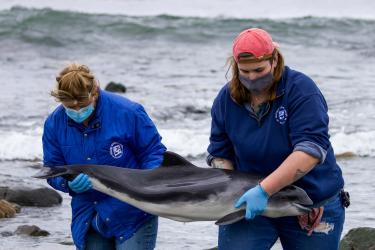March is Women’s History Month. We’ve asked five of our women scientists to share a little about their science journey, what hurdles or obstacles they’ve experienced during their journey, how they overcame them, and what advice they might have for the next generation of women scientists. Candid, honest and full of sage advice, find out more each week in March as we feature their incredible stories.
Elizabeth Marchetti is a field scientist located at our Narragansett Laboratory in Rhode Island and works for the Cooperative Research Branch. She collects fisheries data aboard commercial fishing vessels and assist commercial fishermen with their electronic reporting.
1. Can you tell us about your science journey, your career in science?
I grew up on Long Island, New York and was infatuated with everything marine-related, and ever since I was a little girl I knew I wanted to have a career that somehow involved the ocean. I went to the University of Rhode Island (URI) and graduated with a Bachelor of Science degree in marine biology. While at URI my college advisor suggested that I seek out every opportunity that might build a foundation for a career in marine science. Heeding that advice, I interned at the Whale Center of New England in Gloucester, Massachusetts. I also spent a semester abroad studying coastal ecosystems and their management at Southern Cross University in Australia and volunteered at Mystic Aquarium in both the Fish and Invertebrates Department and the Seal Rescue Clinic. After graduation I landed a 5-year sea technician position for the Ocean Technology Foundation working on the Lobster Restoration Project in response to the 1996 North Cape oil spill. It was here, working aboard commercial lobster vessels, where my love for commercial fisheries began. I was fortunate to continue working in fisheries when I was selected for a port agent position in Point Judith, Rhode Island with NOAA’s Greater Atlantic Regional Fisheries Office. I collected biological samples like otoliths, vertebrae and scales for fish ageing, and assisting with regulation inquiries made by commercial fishermen. My devotion and passion for fisheries led me to where I am today, a field scientist with the Northeast Fisheries Science Center’s Cooperative Research Branch. I now live the best of both worlds! I collect valuable fisheries data aboard commercial fishing vessels and assist commercial fishermen with their electronic reporting. While I may have dreamed of researching orca whales from a zodiac boat off of the coast of British Columbia, I know I’m exactly where I am supposed to be and where I’m most needed.
2. Could you share an example of a hurdle or obstacle you experienced during your science journey and how did you overcome it?
Life will always have hurdles and obstacles that we must navigate through. Science is no different; they’ll ebb and flow just like the tide. One of my hurdles happened my sophomore year of college. For financial reasons I had to leave URI and attend a community college in New York. I was devastated. Hit by a tidal wave of worry, I had no idea where my future was going to go. But, to my great surprise, I had the most amazing oceanography professor. William was a retired Navy Seal and his teaching captured my entire attention and refueled my energy and passion to stay on course. I returned to URI as a junior, ready to conquer even more!
3. What has been your biggest career and/or personal achievement?
I like to think a big achievement was being selected as a Block Island Wind Farm fisheries liaison. This position was the first of its kind in the country regarding construction of offshore wind farms. I was an independent contractor selected from a pool of candidates by the Fisheries Advisory Board, Rhode Island Coastal Resources Management Council, Deepwater Wind and National Grid to facilitate communication between these organizations and the commercial fishing industry. It was imperative for those in the fishing industry to receive construction information in a timely and accurate manner to maintain business preparations facing construction schedules. I distributed daily briefings including construction schedules and project activity updates. I held meetings in Point Judith and South Kingstown, Rhode Island, and on Block Island to keep industry up to date with the project’s progress. I also conducted gear cruises to make sure all gear was removed from construction areas prior to the Wind Farm and sea2shore power transmission cable construction. This liaison position allowed me to continue and grow in the commercial fisheries field, and from a different perspective: offshore renewable energy. The Wind Farm was a pilot project and now there are multiple proposed lease sites off the East Coast, from Massachusetts to Virginia.
On a more personal achievement, I completed my first 50K at Pisgah Mountain in New Hampshire in September 2017. It was a 31 mile, 6 hour 11 minute passage through the beautiful northern mountain woods.
4. What advice would you give young women about a career in science?
All roads have their challenges. I think it’s crucial to remain true to yourself. Be proud of who you are and where you come from. I thank my United States Marine Corps father for passing down his strong work ethic to my sisters and I. I’m also thankful for my mother who taught us that nothing is unattainable if you remain on course and follow your dreams — even if it means coming home smelling like fish.



